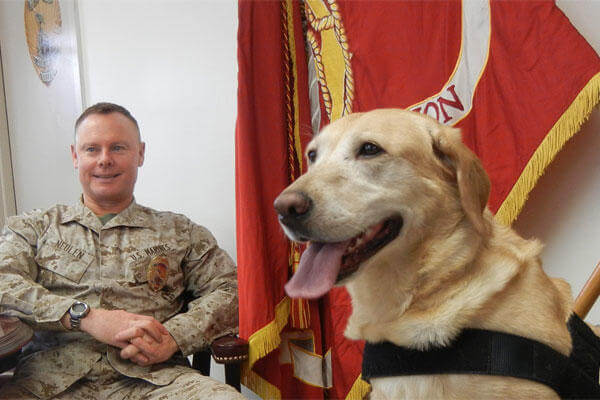MARINE CORPS BASE QUANTICO, Va. -- The latest addition to the Quantico Provost Marshal’s Office made the switch from active duty to civilian employment without so much as a Transition Assistance Program seminar. As far as Col. Barry Neulen, Security Battalion’s commanding officer, was concerned, he couldn’t hire Dixie soon enough.
“Ever since I got here, I wanted to get a mascot for Security Battalion,” Neulen said. “I was asking about a dog when I took over in 2011.”
What he got was a 5-year-old yellow Labrador retriever and retired improvised explosive device-detecting dog. Dixie is a veteran of a six-and-a-half-month tour in Afghanistan, ending in October of 2011, and now roams the halls of the Provost Marshal’s Office proffering her favorite toy, a well-loved length of orange rope, to anyone willing to play for a minute.
“It’s amazing how Dixie’s presence kind of brings tensions down and puts a smile on everyone’s face,” Neulen said.
He said he’d been aware that military working dogs were coming up for adoption as their program is being downsized, but priority is given to military dog handlers. Working through the Headquarters Marine Corps Security Division’s military working dogs program manager, he got on the list to adopt a dog, and the process to take Dixie on at PMO started last November. She finally arrived in late February.
Neulen said her combat tour seems to have left her a little skittish, but she’s “a very sweet dog” with “an incredible personality.”
According to Dixie’s records, said 1st Sgt. Tonia Igo, the Military Police Company first sergeant, she was present for a few firefights in Afghanistan, where she didn’t find any explosives but also never missed one.
Her duties as mascot will include public relations at programs and events, such as those the PMO participates in with base schools or Lincoln Military Housing, as well as making the rounds at Security Battalion and, occasionally, the fire department, practicing her own brand of therapy, Neulen said.
“In her first week, I brought her to the base staff meeting with me, and she was the most popular individual there,” he said.
“She does have an uncanny way of energizing any room, any audience,” Igo said, adding that the dog also seems to have a way of sensing who in PMO is most in need of a little healing, such as the officers most affected by last week’s shooting.
“It’s a win for the dog and for the Security Battalion,” Neulen said.
For now, Dixie is spending nights at Igo’s home, until a policy is drawn up for handling this new billet within the battalion, at which point she will likely live on the premises 24 hours a day.
























